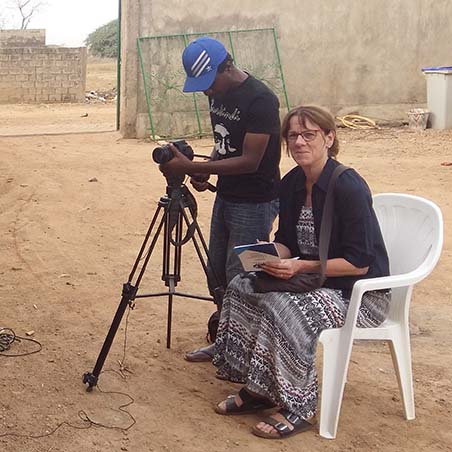Joan Baxter
Author and Journalist
Bachelor of Journalism, 1982
There’s nothing I love more than getting to the bottom of a really complex story.
Photo: Joan Baxter in November 2018 in southern Burkina Faso, with Roger Guibre (left), Thierry Bayala (centre), and Armand Bayala (right).

Whether it’s reporting on a revolution in Burkina Faso, a failed coup d’état in Cameroon, or the prospect of open pit gold mining in Nova Scotia, Joan Baxter always remembers a lesson she learned at King’s.
“If you don’t get your lede right you can just forget it,” she says.
Getting that first line in a story right—the one that grabs the readers’ attention and compels them to read on—is paramount for Joan. So is another lesson.
“We also learned to question things. To question everything.”
Today, that is what she does.
The first line of Joan’s journey to journalism places her in Guatemala where she was doing research on spider monkeys for her Master’s degree in primatology. There was a civil war going on there that she realized she knew little about. “People were disappearing all around me, and I didn’t know.” she says.
At the same time her parents were travelling in Northern Labrador.
“I flew directly to Nain to meet up with them. I was so shocked by what I saw—the racism and the poverty—I realized I didn’t know anything about the world. Not here. Not in Guatemala. I wanted to start finding out about it and writing about it. That’s why I went into journalism. That’s why I went to King’s.”
The questioning began. So did her writing. After graduating, she and her husband moved to West Africa. Joan began to freelance from Niger for the Globe and Mail and the Toronto Star. They moved to Cameroon, then Burkina Faso where she started to report for the BBC. After that it was northern Ghana and then Kenya. All the while she was reporting and writing books.
“That’s where I got a ‘real’ job, in Kenya,” Joan says with a laugh. “It was with the World Agroforestry Centre. It was a real privilege to work there.”
Not just a privilege. It was foundational. The centre is a global force in researching food security and environmental sustainability.
“For four years I was their Senior Science Writer travelling all over Africa, with African scientists, learning about traditional, environmentally sustainable methods of farming that were being decimated by neo-liberalism. It was an amazing education and I loved it.”
Joan and her family eventually moved back to Nova Scotia. She found the same forces at work in Canada that she had seen in Africa. She dug in, researching and writing. She wrote her seventh book, The Mill – Fifty Years of Pulp and Protest. It tells the story of a controversial pulp mill at odds with indigenous people and the environment.
“There’s nothing I love more than getting to the bottom of a really complex story and in the end pulling it all together. Maybe a few people will read it and it might cause them to rethink something.”
There’s a lot she believes we need to “rethink”.
“We have to have change, or we won’t be here in a hundred years. Ecosystem collapse and climate change and the colonial mentality—it has to change.”
Joan admits that there are times when she feels overwhelmed by the size of the problem. But then she remembers that she is not alone.
“The fulfillment I get doing this kind of work is from the number of people I get to meet who are fantastic. There are a lot of people who are asleep but there are so many who are out there, giving their all to fight poverty or fight for the environment. That is just so fulfilling for me. They are building community and that is the basis of democracy.”
Joan’s story is one of passion for the truth and it always begins with that important first line.
Posted: June 2019
 Connect with Joan Baxter
Connect with Joan Baxter